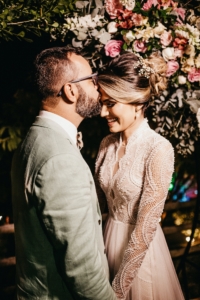8 Important Pre-Marriage Counseling Questions
As you approach engagement or if you are newly engaged, it is important to the start of a thriving and successful marriage to take time to learn more about your significant other. This often means having difficult conversations, talking about the future, and digging deeper into your past to discover how it made you into who you are today and where you hope to go.
 It is better to have important and life-shaping conversations before you vow to spend your lives together. These conversations can help you discover any red flags or draw you closer to one another as you prepare to spend your lives together, for richer and poorer, in sickness and in health.
It is better to have important and life-shaping conversations before you vow to spend your lives together. These conversations can help you discover any red flags or draw you closer to one another as you prepare to spend your lives together, for richer and poorer, in sickness and in health.
Having important conversations before you wed can help you set realistic expectations for your marriage, improve your communication skills, and strive to improve your conflict-resolution skills before you face any major relationship challenges and barriers.
Greg Smalley said, “Make it your goal to create a marriage that feels like the safest place on earth.” The goal of marriage is not to appear perfect all the time, the goal is to create a safe place for pure authenticity between two people.
Pre-Marriage Counseling Questions to Ask Before You Say “I Do”
Here are a few questions to delve into with your significant other as you prepare to say “I do”:
1. What does a marriage commitment mean to you?
 It is important to talk through commitment and what it means to each of you. Once you walk down the aisle and vow to spend your lives together, does that mean through thick and thin? Does that mean you vow to keep working even when you feel disconnected and distant from one another? What does that mean when one of you gets a job offer in a different place? Take time to talk through marriage commitment and why you were drawn to your significant other.
It is important to talk through commitment and what it means to each of you. Once you walk down the aisle and vow to spend your lives together, does that mean through thick and thin? Does that mean you vow to keep working even when you feel disconnected and distant from one another? What does that mean when one of you gets a job offer in a different place? Take time to talk through marriage commitment and why you were drawn to your significant other.
Henry Ward Beecher said, “Every successful marriage is the result of two people working diligently and skillfully to cultivate their love.” Spoiler alert: marriages face difficult seasons, therefore having these conversations and vowing to put the work into your marriage will help it grow and thrive on a beautiful level.
2. What are your life goals?
You must talk through your life goals, not only so your spouse can support you, but so that you can support them. Ask one another about your personal goals, career goals, and spiritual goals. What dreams do you have for your marriage? Do you hope to retire to the Arizona desert and start a nonprofit one day? Dreaming big together can draw you closer and help you support one another now and in the future.
3. What is your financial plan?
The battle with finances and how to handle finances is one of the major causes of fighting and disagreements in marriage. Engaged and married couples must continue to have financial conversations and plan together. Sit down and create a financial plan. Put your expenses on paper. See if you need to cut any expenses so you are not living hand-to-mouth.
Take time to talk through the plan for handling money:
- Will you have separate bank accounts, joint checking accounts, or both?
- Who will pay the bills?
- How will you handle disagreements about how money should be spent?
- Do you plan and agree to have full financial disclosure with your spouse?
- What kind of debt are you going into marriage with?
- Do you have or plan to have credit cards?
- What is your credit score goal and how can you work together to get there?
- Will you have an emergency savings fund?
- Do you plan to start saving for a home or another major first purchase together?
- Do you plan to start savings accounts for your children?
4. What is your plan for living arrangements?
If you both have your own place right now, what is your plan once you are married? Where do you hope to live once you begin having children? Talking through your plans can help alleviate stress and begin your journey in the best way possible. Establishing healthy communication is one of the best things you can do for your marriage relationship.
5. What are your desires for growing your family?
 Some couples wait until years into their marriage to talk about their hopes and dreams for a family. To avoid miscommunication in the future, it is helpful to just talk through what you pray for someday. Do you hope to have children? Are you wanting a big family or a small family?
Some couples wait until years into their marriage to talk about their hopes and dreams for a family. To avoid miscommunication in the future, it is helpful to just talk through what you pray for someday. Do you hope to have children? Are you wanting a big family or a small family?
Have you had an abortion in the past that you have not discussed with your significant other? Do you hope to raise your child in church? What are your hopes and dreams for your family? Do you hope mom stays home with the children or do you hope to continue working?
How did your childhood impact your hopes and dreams of having a family? If you were raised in an abusive home and previously felt reluctant to tell your significant other, now is the time. If there were parts of your childhood and upbringing that made you into the person you are today and hope the same for your family, share those memories and dreams.
6. What are your mutual expectations?
Talking through various parts of your life and relationship can help avoid major disagreements and fallout in the future. Just talking through mutual expectations for your marriage can help cut those disagreements and frustrations in half. It is crucial to know that couples will have disagreements. Marriage is a game of working together to find common ground.
- Will you spend holidays rotating between both sides of your family?
- How will you support one another through chaotic work seasons?
- What are your hopes for physical intimacy?
- Do you hope to attend church together?
- What kind of relationship do you hope your children have with your parents?
- How will you continue dating one another?
- Do you hope to continue date night once a week?
- Do you agree on time with friends – separately and together?
“Behind every great relationship are difficult and uncomfortable conversations we rarely get to see. Great relationships don’t just fall into our laps. They require people to move through their fears and insecurities and do the hard work to move wounds into healing.” – Vienna Pharaon
7. How will you resolve conflicts?
Having a plan for resolving conflict is one that every relationship can benefit from. If you are having a conversation that continues to escalate, how can you manage it before it spins out of control? Can you ask each other for a timeout to calm down and take a deep breath? Are you willing to get creative with your critical thinking skills?
8. What does your spiritual life mean to you and for your marriage?
I pray that your love for each other will overflow more and more and that you will keep on growing in your knowledge and understanding. – Philippians 1:9

To marry someone of like faith is the beginning of a beautiful and one-of-a-kind love story. Marriage, God’s way, is a marriage of forgiveness, grace, compassion, and unique and selfless love. As you begin to embark on your journey together, take time to set goals, pray for your significant other, pray as a couple, and let your faith live larger and louder than your fear.
It is important to realize before you say “I do” that marriage is a journey, not a destination. You will face difficulties. You will have disagreements. You will make up and work through disagreements. You will have seasons of disconnect. You will have seasons of beautiful and one-of-a-kind connection. Marriage is a beautiful ride and one that is worth the difficult conversations.
Christian Premarital Counseling
As you prepare for marriage, consider pre-marriage counseling to help work through these topics and to help you set realistic expectations for your marriage, improve your communication skills, and strive to improve your conflict-resolution skills before you face any major relationship challenges and barriers. You can invest in the future of your marriage by attending pre-marital counseling with a counselor who wants to see your relationship soar.
“Holding Pinkies”, Courtesy of Jasmine Wallace Carter, Pexels.com, CC0 License; “Save the Date”, Courtesy of Olya Kobruseva, Pexels.com, CC0 License; “Surprise Proposal”, Courtesy of Radu Florin, Pexels.com, CC0 License; “Forehead Kiss”, Courtesy of Jonathan Borba, Pexels.com, CC0 License

 We delight to connect with others, to know and be known and loved by others. In our relationships, we make ourselves vulnerable, build networks of mutual dependence and build parts of our lives based on those relationships.
We delight to connect with others, to know and be known and loved by others. In our relationships, we make ourselves vulnerable, build networks of mutual dependence and build parts of our lives based on those relationships. Part of trying to address a broken relationship is to understand why it broke down in the first place and to do the challenging work that may be needed to change. It may be that in trying to understand what happened, you may uncover a misunderstanding and that gets things back on track.
Part of trying to address a broken relationship is to understand why it broke down in the first place and to do the challenging work that may be needed to change. It may be that in trying to understand what happened, you may uncover a misunderstanding and that gets things back on track. In other words, it can get complicated, but being willing to examine ourselves and apologize may be a necessary precursor to reestablishing the relationship. This doesn’t mean backtracking and dismissing what was said but acknowledging the pain that may have been caused or boundaries traversed.
In other words, it can get complicated, but being willing to examine ourselves and apologize may be a necessary precursor to reestablishing the relationship. This doesn’t mean backtracking and dismissing what was said but acknowledging the pain that may have been caused or boundaries traversed. When a relationship is broken, both parties may agree that things went wrong, and that the situation needs to be resolved. When things go awry in a relationship, the sense of trust and vulnerability may be broken, and you become a bit more wary of one another. A relationship, even one that the people in it are willing to work at, doesn’t just snap back to what it was before the issue arose.
When a relationship is broken, both parties may agree that things went wrong, and that the situation needs to be resolved. When things go awry in a relationship, the sense of trust and vulnerability may be broken, and you become a bit more wary of one another. A relationship, even one that the people in it are willing to work at, doesn’t just snap back to what it was before the issue arose.